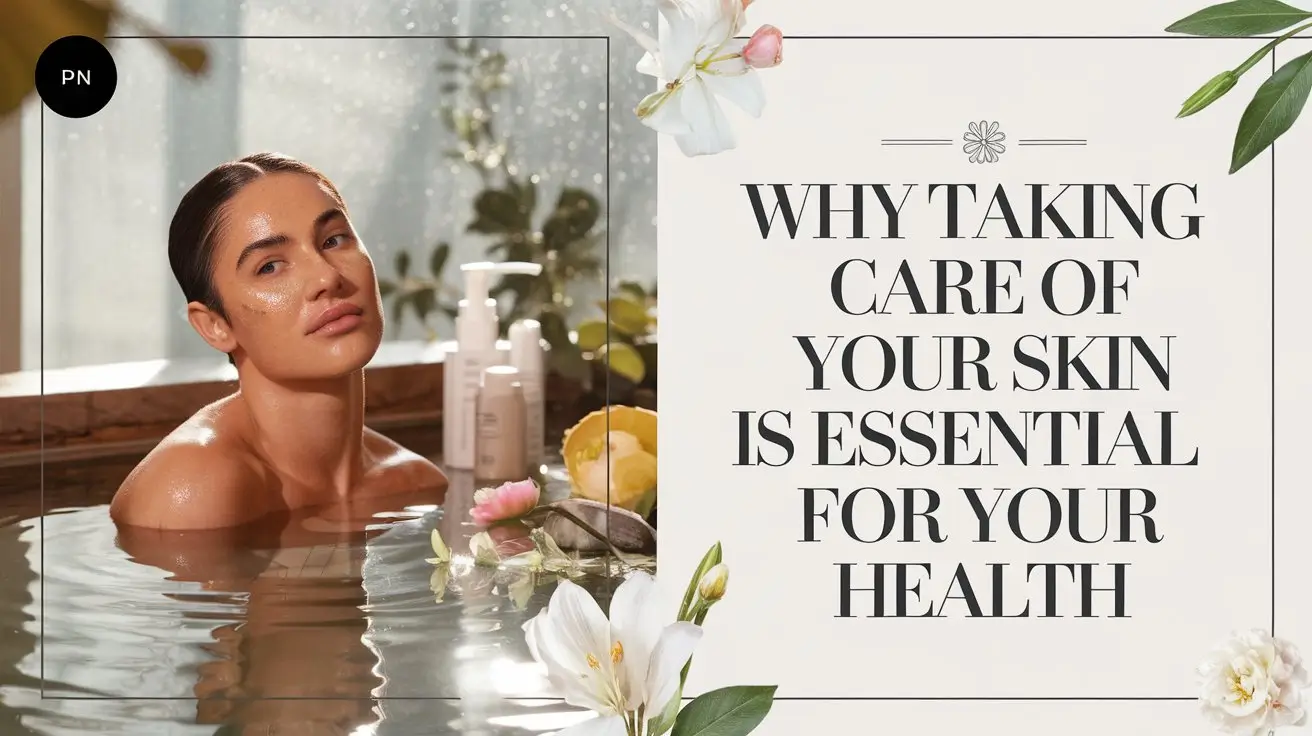I used to think skincare was just about looking good, but over time, I’ve realized it plays a much bigger role in overall health. The skin is the body’s largest organ, and taking care of it goes beyond cosmetic reasons. Healthy skin protects against infections, regulates body temperature, and even helps in the production of essential vitamins.
There was a point when I didn’t pay much attention to my skin. I skipped sunscreen, used harsh products, and didn’t bother with moisturizing regularly. Eventually, I started noticing dryness, redness, and occasional breakouts. It wasn’t until I made small, consistent changes that I began to see a difference – not just in appearance but also in how I felt.

In this article, I’ll explain why taking care of your skin is essential for your health and how simple routines can lead to long-term benefits.
1. The Skin’s Protective Role
One of the most important functions of the skin is to act as a barrier. It protects the body from harmful bacteria, viruses, and environmental pollutants. When the skin is healthy and intact, it prevents infections and keeps harmful substances from entering the body.
I learned this the hard way. A few years ago, I had dry, cracked skin on my hands during winter. I didn’t think much of it until I developed a mild infection. After that, I started using hand cream regularly, and the problem didn’t come back.
By keeping your skin moisturized and protected, you can reduce the risk of infections and other skin conditions.
2. Regulating Body Temperature
The skin helps regulate body temperature by producing sweat and controlling moisture levels. When the skin is healthy, it performs this function efficiently, helping the body stay cool or warm as needed.
I remember running during summer and feeling how my body naturally cooled down through sweating. On days when my skin felt irritated or sunburned, I could feel the difference—my body struggled to stay comfortable.
Taking care of the skin by staying hydrated and using sunscreen can help it function properly, keeping you comfortable in different weather conditions.
3. Vitamin D Production
Skin plays a key role in producing vitamin D when exposed to sunlight. This vitamin is essential for bone health, immune function, and mood regulation. However, overexposure to the sun can lead to sunburn, premature aging, and even skin cancer.
I used to avoid sunscreen because I thought it would block vitamin D absorption. But after doing some research, I found that short periods of sun exposure, combined with sunscreen, provide enough vitamin D without damaging the skin.
Protecting your skin from UV rays while getting moderate sunlight is the best balance for maintaining vitamin D levels.
4. Preventing Skin Cancer
Skin cancer is one of the most common forms of cancer, and unprotected sun exposure is a leading cause. Regularly using sunscreen and avoiding long hours under direct sunlight can significantly lower the risk.
After noticing a few new moles on my skin, I scheduled a check-up with a dermatologist. Thankfully, there were no issues, but that visit reminded me to take sun protection seriously. Now, applying sunscreen is part of my daily routine, even on cloudy days.
5. Mental Health and Confidence
Healthy skin can improve confidence and mental well-being. When the skin feels clear and hydrated, it can boost self-esteem. I’ve noticed that when my skin feels good, I feel more confident in my day-to-day life.
There were periods when breakouts or dry patches affected my mood. By focusing on a simple skincare routine—cleansing, moisturizing, and protecting—I felt more in control, which helped my overall mental state.
Skincare isn’t about achieving perfection but about feeling comfortable in your skin.
6. Early Detection of Health Issues
Changes in the skin can be early signs of underlying health conditions. For example, discoloration, rashes, or new moles could indicate something more serious. By regularly checking the skin and paying attention to changes, it’s easier to catch potential health issues early.
I make it a habit to check my skin every few months, looking for anything unusual. This small step can make a big difference in catching problems early, when they are easier to treat.
Simple Ways to Take Care of Your Skin
Taking care of your skin doesn’t have to be complicated. Small, consistent steps can lead to healthier skin over time.
1. Stay Hydrated
Drinking enough water keeps the skin hydrated from the inside. I used to overlook this, but after increasing my water intake, I noticed my skin felt less dry and looked healthier.
2. Use Gentle Cleansers
Harsh soaps can strip the skin of natural oils, leading to dryness and irritation. I switched to a mild, fragrance-free cleanser, and it made a big difference in how my skin felt after washing.
3. Moisturize Regularly
Moisturizing helps lock in hydration and keeps the skin soft. I use a light moisturizer in the morning and a thicker one at night, especially during colder months.
4. Apply Sunscreen Daily
Sun damage is one of the biggest causes of premature aging and skin cancer. I used to think sunscreen was only for summer, but now I apply it every day, even in winter.
5. Eat a Balanced Diet
What you eat affects your skin. Foods rich in vitamins, antioxidants, and healthy fats can improve skin health. I noticed that adding more fruits, vegetables, and omega-3-rich foods improved the overall texture of my skin.
6. Get Enough Sleep
Lack of sleep can lead to dark circles and dull skin. I make an effort to get at least seven hours of sleep each night, and my skin looks much better when I’m well-rested.
Conclusion
Taking care of your skin is essential for your overall health, not just appearance. By protecting and nourishing the skin, you support your body’s natural defenses, promote better mental health, and reduce the risk of serious conditions like skin cancer.
Small habits, like moisturizing daily and using sunscreen, can have long-lasting benefits. I’ve seen how a simple skincare routine can improve not only the health of my skin but also how I feel overall.
